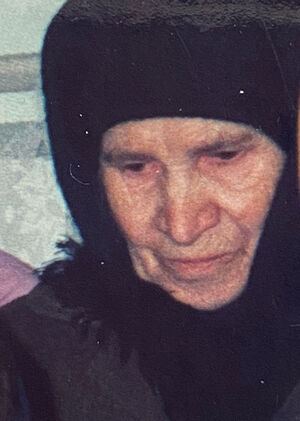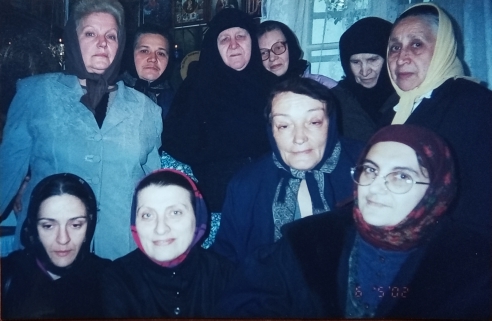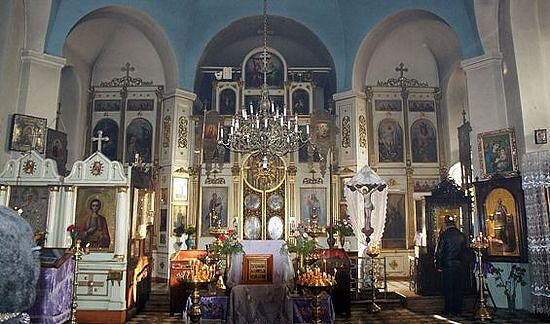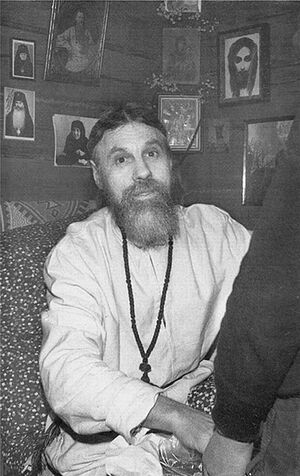To strengthen our faith, the Lord sends us meetings with His saints. They are living examples and the embodiment of humility, patience, selflessness, and love for God and neighbor. I was vouchsafed to meet such people in the Church of St. Alexander Nevsky in Tbilisi.
According to local old-timers, in the Soviet era there was a kind of a secret monastery at St. Alexander Nevsky’s Church, where the following Glinsk elders struggled: Metropolitan Zinovy ??(Mazhuga), Schema-Archimandrite Andronik (Lukash), and Schema-Archimandrite Vitaly (Sidorenko; 1928-1992), along with many secret monks and nuns. Their spiritual children would often travel from Russia to Vladyka and the Elders for advice. Sometimes only monks would sing in the choir, and such services were unforgettable.
I didn’t see the Elders, but the Lord vouchsafed me to meet their followers—their spiritual children. And there was a lot to learn from them. One of them was Mother Maria (Kalinina), later Schemanun Xenia.
She was a true disciple of Fr. Vitaly. She spoke a lot about him and other marvelous elders whom she had had the privilege of communicating with. Unfortunately, at that time it didn’t occur to me to write down her stories, and now that twenty years have passed, there’s little left in my memory.
Mother’s early years
Mother Maria was born in Russia to a simple peasant family. Her parents were very religious people who went through the difficult years of trials for Russia and the Orthodox Church. It was a time of dispossession, expropriation, and collectivization, when “surpluses” were taken away from the peasantry. All the cattle were taken away from the Kalinins. The father of the family was against collectivization, but nevertheless joined a collective farm and worked there solely out of pity for the animals. The family lived half-starved. Sometimes they ate only bread and water. Mother Maria’s father was entitled to a ration of some milk and sour cream, but he didn’t often bring it home—out of the kindness of his heart, he couldn’t refuse sharing it with destitute peasants with starving children. His wife sometimes scolded him: “Your own children have nothing to eat except bread,” and he would explain that those children didn’t even have bread and could die of hunger. “Never mind! We’ll endure, and God won’t abandon us.” When he died, the whole of the village gathered for his funeral, sobbing and lamenting: “What a benefactor we’ve lost!”
The children inherited strong faith and the spirit of non-acquisition from their parents, and Mother was an unmercenary and ascetic all her life.
I don’t remember if their family was large, but I know for sure that she had a brother and a sister. In the 1990s, when I first met Mother Maria, her sister, an elderly schemanun, lived in Moscow with a cell-attendant, and was a spiritual daughter of Archimandrite Kirill (Pavlov).
At a convent
In her youth, Mother Maria used to make pilgrimages to holy sites. She liked life in convents very much, so she entered one and took monastic vows.
One day the abbess of the convent left on business, leaving Mother Maria in her place. The leadership position didn’t change Mother Maria’s simple way of life. A pilgrim—a sick man—arrived at the convent. He was given shelter, and Mother Maria would bring him food and speak to him. At the enemy’s instigation, the sisters of the convent were tempted and became suspicious of her behavior.
Upon the abbess’ return, the sisters slandered Mother Maria and accused her of committing a sin of the flesh, and she was expelled from the convent. It was winter and cold. Mother Maria walked from house to house, knocking on their doors and asking for a place to stay overnight, but all in vain since people were afraid of the authorities: To shelter a nun was dangerous in those days. She had to hide for some three days, spending her nights under a large pine tree. Her legs were swollen from the bitter cold, and she had difficulty walking. In such a deplorable state, she was picked up by one compassionate woman who sheltered her and nursed her back to health. Then Mother Maria had to leave the woman’s house. She wandered, spending her nights at a train station, where Elder Vitaly found her and took her with him.
Arrival in Georgia
With the blessing of the Glinsk Elders, Mother Maria moved to Tbilisi and began to carry out her obedience in the choir at St. Alexander Nevsky’s Church.
At first Mother Maria missed Russia very much and was eager to return. She asked for Fr. Vitaly’s blessing, but he answered her with a joke: “Maria, whoever drinks water from the Kura River will not leave this place.” Thus, he didn’t bless her to return to Russia.
A clairvoyant nun and comforter
When I first started singing in the choir, it was hard for me to understand the order of the service and memorize the hymns, and I got upset. Mother Maria consoled me sympathetically: “Cheer up, Nika. Everything will be fine. You’ll even be a cantor and a choir director here.” I thought to myself: “The good Mother simply wants to comfort me.” I was sure that I would never understand and remember all of it. But with the help of God and through the prayers of my spiritual father, Fr. Vyacheslav Velichko, I slowly began to make progress, and a year and a half later Mother Maria’s words came true—I was appointed as cantor and choir director.
Mother Maria’s ministry in the Church
Sometimes it happens that at first a person enters the Church with the fear of God and treats everything there with reverence. But gradually he gets used to it, everything becomes ordinary, the soul loses its state of reverence, and idle talking, laughter, and joking during services begin. Over the many years of her life in the Church, Mother Maria didn’t lose the fear of God and was for us a living example of reverent behavior.
Mother Maria shared the following story. Once in a dream she was in the middle of the church. The royal doors leading to the altar opened, and she saw the Savior crucified on the Cross. Suddenly the wounds on His hands and feet started bleeding. The Lord came to life and turned to Mother Maria with the following words: “You see how people are crucifying Me again. By talking in church, they hammer in a nail; by laughing and joking they hammer in another nail; and by quarrelling they hammer in another one…” (And He continued to list the sins committed in church). Mother Maria woke up in horror—the feeling was so real! She possessed spiritual wisdom and was wary of visions. She approached Archimandrite Raphael (Karelin) for advice, and he confirmed that it had been a sign from God.
Her story made a strong impression on us. Later we hung a sign in the choir (as a reminder) with the saying of St. Ambrose of Optina: “For talking in church, the Lord allows you to fall into grave temptations” (meaning talking during services).
Mother Maria related: “Whenever the Glinsk Monastery Elders celebrated the Liturgy, we forgot about the time and didn’t feel any fatigue, as though we were in Heaven.”
Mother Maria carried out her obedience in the choir for many years. She was said to have had a beautiful voice in her youth. But I met her when she was elderly and her voice had begun to crack. She attended church services every day, was always punctual and reliable—she would never let you down and was the first to rush to help you.
She spent most of her time in silence. But her silence wasn’t because she was sullen. She was always welcoming and kind. If she entered into a conversation, it wasn’t for idle talk, but to say something useful for the soul. However, the tone of her voice was never didactic or moralizing. It was always a friendly conversation based on mutual trust.
In her spare time, Mother would sit in her corner of the kliros, pulling on the knots of a prayer rope or reading the Psalter. She spent most of her time in prayer. She was quiet and inconspicuous.
“The whole world has gone mad”
On Wednesday evenings, a moleben with the akathist to St. Nicholas the Wonderworker was always served at St. Alexander Nevsky’s Church. One day Mother Maria decided not to stay for the moleben, but went about her business. On the way she began to read the akathist on her prayer rope. Stopping at a shop window, she started scrutinizing the goods and prices. Then a strange-looking man running past barked right into her ear: “The whole world has gone mad!” At that moment she suddenly realized that she had been distracted from prayer. She took her prayer rope and continued on her way praying.
It’s more blessed to give than to receive
As already noted, Mother Maria was non-acquisitive and led an ascetic life. Whatever came her way, she distributed to the needy. I don’t remember her ever treating herself—she was a strict faster. She would drink only hot boiled water and say: “Don’t pour me a dirty one,” (that’s what she called tea leaves). “I’ve been used to it since childhood.” Whenever someone treated her to cake or candy, she didn’t refuse. She would take it, wrap it up and, as it turned out, give it to the old infirm nuns who lived in a small community not far from the church.
I heard from Mother Maria that the Elders had blessed her to live in seclusion, and only if necessary she could shelter someone for a period of no more than three days. She fulfilled this blessing without fail.
She lived on the outskirts of the city. I visited her when she was ill and I was struck by the austerity of her life. She had only an iron bed, a bedside table, a small table, a stool, and a kerosene stove in her tiny, semi-dark hut. The only coat hung on a nail. Her ascetic life wasn’t ostentatious and not an end in itself. She concealed her asceticism as best she could.
For all her poverty, Mother Maria’s neighbors repeatedly robbed her. Climbing over the fence when she was away, they would steal whatever they could: the one valuable icon, a canister of kerosene (her reserve for the winter), and even half-eaten khachapuri.1 In the end, they cut her electrical wires, and Mother Maria was left without electricity, and had to kept by with a rushlight. We found all this out by chance—she endured trials patiently and never complained.
And though I bestow all my goods to feed the poor, and though I give my body to be burned, and have not charity, it profiteth me nothing. Charity suffereth long, and is kind; charity envieth not; charity vaunteth not itself, is not puffed up, Doth not behave itself unseemly, seeketh not her own, is not easily provoked, thinketh no evil; Rejoiceth not in iniquity, but rejoiceth in the truth; Beareth all things, believeth all things, hopeth all things, endureth all things (1 Cor. 13:3-7).
Mother Maria possessed all of these qualities of love.
“Maybe I’m sinning and don’t know it”
Mother Maria had a predilection for reading spiritual books. Whenever something was unclear to her, she consulted with us in the simplicity of her humble spirit. One day she was reading a booklet with a list of sins. There she found a term that she didn’t understand, which meant one of the impure carnal sins. Mother Maria came up to Mother Elizabeth and wondered what the word meant. She was surprised:
“Mother, why are you interested in this?”
“Maybe I’m sinning and don’t know it…”
“No, you definitely don’t sin this way. It’s better for you not to know what it is.”
Mother Maria stopped worrying and understood everything. She was humble and chaste.
Despite the many miracles she had seen, she was devoid of exalted sensitivity and reasoned soberly and wisely.
Contact with holy elders
Elder Vitaly often gave Mother Maria special assignments. One day he sent her to another city with a package, to an exact address. Batiushka saw that a great tragedy was brewing in that house. It turned out there was a woman with some children living there, driven to despair because of hunger. She was already thinking about suicide when Mother Maria appeared on her doorstep with the package from Batiushka, which contained food. The woman wasn’t familiar with Fr. Vitaly and had never heard of him before. She was very surprised and delighted.
The Elder often gave Mother Maria instructions to send packages of food to needy people by mail.
There was another such case with Mother Maria. When she was younger, her parish priest told her to clean the floor of the altar. She was terribly frightened, daring not to enter the altar, but the priest insisted. Then Mother Maria crawled into the altar on all fours, washed the floor with trembling hands, and crawled out the same way. That night she had a dream. She saw the ambo, fenced on either side up to a certain point, and she heard a voice: “Never go farther than this.”
Mother told the Elder everything. He rebuked her slightly and forbade her to enter the altar.
One day Mother Maria gave me a ball of thread and asked me to knit a jacket. I wasn’t up to knitting then, but I couldn’t say no to my beloved Mother Maria. The next day, she shyly asked me to return the thread, saying: “Fr. Vitaly scolded and forbade me. He said: ‘Don’t burden her.’” (Batiushka had already been dead for several years). Mother didn’t even notice that she had let it slip. She perceived everything so simply herself.
I was surprised, but didn’t ask her any questions so as not to embarrass her.
Mother’s blessed repose
Shortly before her death, Mother Maria fell ill and took to her bed. She was taken to the convent hospital, where she was cared for by the nuns. We sometimes visited her, and this is what she told us.
During this period, her hut almost collapsed, and Matushka was tormented by the question of where she would live after leaving the hospital. And then, in a dream she saw the Elders walking together in the distance. Fr. Andronik broke away from the bunch, silently approached her, put a note in her hand, and just as silently went after the Elders again. The note read: “Don’t cling to earthly things.”
And indeed, Mother no longer needed any earthly abode. Soon she passed away there, in the convent, while standing in church during a service. Precious in the sight of the Lord is the death of His saints (Ps. 115:16).
She was buried in the village of Norio (not far from Tbilisi) in the convent cemetery.
MEMORIES OF SCHEMANUN XENIA (KALININA)
“Bless me, Batiushka!”
Fr. Alexander Baiashvili:
I thank God that I knew Schemanun Xenia. I remember her as a model of Christian humility, non-acquisitiveness, and obedience. She wore the same coat in both winter and in summer and lived in poverty for many years. She never spent the money that was given to her in church on herself—she gave it away to others.
Once, when I had an operation, through our acolyte she sent me a sum of money which at that time was considerable, especially for her.
Mother Maria told me that she had moved to Georgia with the blessing of the Glinsk Elders and had been a spiritual daughter of Fr. Vitaly (Sidorenko). She showed me his letter, which she cherished, containing the Elder’s spiritual instructions.
Mother related an episode from her childhood how one time she couldn’t even get into the church yard on a certain feast because there were so many people. She was very worried, and she sat down on a bench and burst into tears. A woman approached her and started consoling her, saying: “Don’t worry, everything will be fine.” Mother calmed down, and when the people had dispersed and she could safely enter the church, she recognized this woman in the icon of the Martyr Parasceva.
She also talked about how St. Seraphim of Sarov had saved her from rapists. Many of us were aware of the story and knew how she venerated St. Seraphim. But she spoke about it with humility and without any conceit.
Matushka came to Georgia with the blessing of the Glinsk Elders. She was walking alone from the station to the place where she was supposed to stop. It was in the evening. Suddenly two men stopped her and started asking her questions. She understood from their behavior that they had bad intentions (she was still young at the time) and she prayed silently: “Venerable Father Seraphim, help!” Suddenly she saw an elder approaching them, exactly as depicted in St. Seraphim’s icons, and he pulled the men away from Mother by their sleeves. She ran away in fear, and the looking back, she saw the following: The Elder was standing there and speaking to them, and they were listening to him quietly, hanging their heads. Mother later regretted not having thanked the Elder.
I recall when Mother Xenia was seriously ill and was lying in the monastery, the nuns looked after her. I was an altar server then and came to visit her. As I was leaving, I heard her say to me: “Father, bless me.” I was at a loss and thought she probably mistook me for a priest because she was so sick and old. Although I wasn’t in a cassock, and she knew very well that I was just an altar server. But she repeated again: “Father, bless me!” We said goodbye, and I left, of course not daring to bless her. I visited Mother for a second time, and before leaving I heard her say to me again: “Father, bless me!” I didn’t know then that a few years later I would become a priest.
There was another story. Mother Xenia was talking to my mother. I had just started going to church and helping in the altar, and my mother had apprehensions about it. She was afraid I would abandon my studies (I was studying at a medical institute). I remember how Mother was talking to my mother and telling her different stories about people who didn’t think they would become priests—who got a degree and were planning to start a profession, but the Lord arranged for them to become priests.
She told her one story, another, and my mother just stood there weeping. Later, when I became a priest, I realized that everything Mother Xenia said was basically what happened to me. I too thought I would become a doctor, and couldn’t have imagined that by Divine Providence my life would change so radically and I would become a priest.
That’s what I can recall about Mother Xenia. And I thank God that I had the opportunity to communicate with such a person. For me she was truly an example of the monastic life—an unmercenary, meek, and humble woman of prayer.
“Her standing at Liturgy was a life in God and with God”
Irina Katamadze:
Schemanun Xenia has remained in my memory forever as a living image of a reverent attitude towards the Divine Liturgy. Her standing at the Liturgy was a life in God and with God. Without teaching, without words of instruction, she gave us an example that we wanted and still want to imitate. It wasn’t until after her repose that we realized how much she meant to the choir. With her departure, a void appeared on the kliros, which remains to this day. Her physical place—on a chest in the corner—is now occupied by other servants of God, but her place in the spiritual sense remains vacant.
Schemanun Xenia seldom entered into conversations. In the intervals between Church services, she would always sit on her chest in the corner and pray, but if she told us something from her memories, it was always very instructive and valuable.
I’ll always remember the lesson she taught me when I was still a full-time choir singer. As the youngest in the choir, I would go to the kitchen for lunch and bring it to the kliros (we had a special blessing to eat on the kliros in our church). At the kitchen they gave me chicken broth. When I brought the pot to the kliros, to my surprise I heard a sharp cry from Mother Maria: “Get that out of here now!” I obeyed her, but the question remained in my soul: Why so sharp? She understood my unspoken question and told me an episode from the life of Elder Andronik that she had witnessed herself.
When the holy Elders were still alive, there was a certain Tamara singing in the choir at St. Alexander Nevsky’s Church. She would bring meals to her landlady from the hospital. One day, as always, she brought a pot in her bag and put it on the chest. The bag was closed, and the pot couldn’t be seen. But, coming out of the altar, Elder Andronik looked at the bag and said: “Tamara, get this bag out of here.” Having said this, the Elder went down the steps and left the church. Tamara didn’t understand the meaning of his words and didn’t take out the bag. When Batiushka Andronik returned to the altar, he looked at the bag again and explained sternly: “Tamara, I told you—get the bag out of here. The angels are turning away.” The Elder hadn’t seen what was in the bag, but he saw how the angels, unable to bear the spirit of meat, were turning away from this place.
So Mother Maria helped me come to understand forever that the choir is a special place of the presence of the angelic powers.
Prepared by Nika Grigoryan
Translation by Dmitry Lapa
Pravoslavie.ru
9/30/2022




